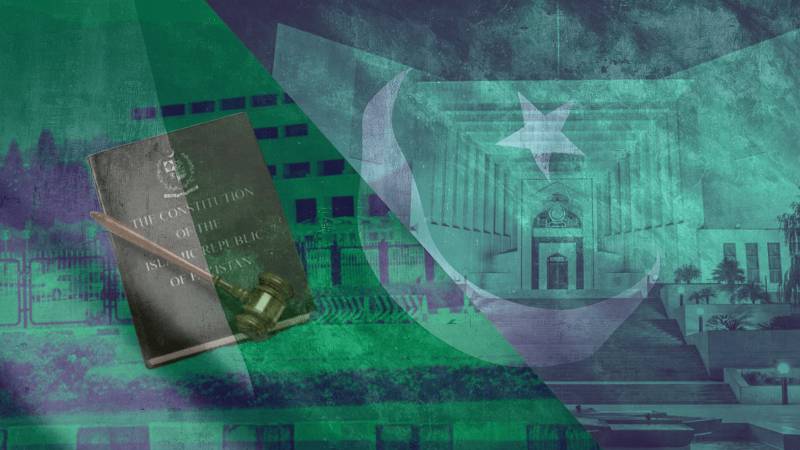
Acquiring or denying political legitimacy through the judiciary or, more accurately, through the Supreme Court or its equivalent forum has been the norm rather than an exception, which dates back to the Molvi Tamizuddin case. The recent short order in the Reserved Seats case has re-ignited a heated debate around this issue. Since power has traditionally flown through the barrel of a gun and its validation or legal cover has invariably been pronounced by the judges, the crisis may have taken on some unfamiliar contours this time.
Although the Supreme Court has found the urge to correct all the wrongs through its judicial pronouncements by interpreting the Constitution the 'correct way' quite irresistible in the past, this overreach and its impacts have been jarring even in the best of circumstances. But the fact remains that, perhaps, in an unprecedented turn of events, the fight seems to have turned into one between two warring factions of our establishment.
In a maelstrom full of rumour-mongering, wild speculations and an unprecedented atmosphere of bitter polarisation, there may still be room to successfully deduce which faction holds sway and which way absolute power will flow based on, amongst others, the interpretation of the Constitution. The Pakistan Tehreek-e-Insaf (PTI) has been the net beneficiary of a few judicial pronouncements in recent years, starting from the Panama/Iqama, Article 63-A and the most recent, Reserved Seats order. It is reasonable to conclude which way the wind has been blowing since 2017, and quite significantly, it doesn't seem to have decisively changed its direction thus far.
During the last National Assembly, the Pakistan Democratic Movement (PDM) government was haunted by the prospect of then-chief justice Umar Ata Bandial regularly forming benches comprising three to four of his preferred judges while ignoring the rest of his brother judges altogether in cases of political importance. This prompted the PDM to pass a law taking away the exclusive right of the chief justice to constitute benches, which could only be termed knee-jerk and short-sighted. One could argue that shifting the power of forming benches to a committee of three judges was a recipe for a more pronounced division on political lines, as compared to a situation where the chief justice was traditionally considered the Master of the Rolls.
In a similar situation, when four senior-most judges of the Supreme Court of India had held a press conference to air their grievances, no new law was promulgated. But in its wake, the then-chief justice had reportedly started consulting four or five of his senior colleagues while his power to form the benches remained unaltered.
Considering how judges, by a ratio of eight to five, have 're-written' the Constitution in the short order regarding the Reserved Seats, the government, it seems, has attempted to erect a defensive mechanism to guard against an impending 'judicial coup' which might pull the rug completely from under their feet. Either way, the incalculable destruction and the veritable collateral damage that both outcomes have the potential to wreak, will take decades to repair
On paper, the recent amendments proposed to the Constitution and the Supreme Court (Number of Judges) Act appear to be quite harmless. But in actual fact, they may be a precursor for a brewing storm. For example, when the above-proposed amendment is read with the constitutional amendment in Article 184(3), it is quite clear that both are aimed at court-packing to thwart any future intervention by the judges through a suo moto action or upon filing a petition in the administrative and parliamentary realm. This explains the timing of the bill.
The above amendment envisages cases, lodged under Article 184(3), to be heard by nine judges and for its corresponding appeal to be heard by a bench comprising more than nine judges. Considering how judges, by a ratio of eight to five, have 're-written' the Constitution in the short order regarding the Reserved Seats, the government, it seems, has attempted to erect a defensive mechanism to guard against an impending 'judicial coup' which might pull the rug completely from under their feet. Either way, the incalculable destruction and the veritable collateral damage that both outcomes have the potential to wreak, will take decades to repair, if at all. From that angle, this may not be the reason enough to legislate and/or tinker with the Constitution, which only shows an absence of intellectual depth and a serious lack of imagination.
Although the timing of such an amendment may also be deemed suspect, the amendments prohibiting judges of the higher judiciary from holding dual nationalities or citizenships is a welcome one. It finally removes a tag of double standards from the whole process where, previously, a public representative could be held accountable by a judge who could potentially hold dual nationality but the former, by law, could not. It remains to be seen whether sitting judges will be subject to this new requirement or not since the government is aggrieved by what it thinks are unconstitutional orders by a judge of the Islamabad High Court who may be a dual national or a green card holder.
Without prejudice to the bon fides (if any) of the recently proposed amendments and their net contribution to the system, the next two months are certain to bring action-packed drama and thrilling sequences like a gripping movie to our living rooms. On the other hand, it is no fun if you are part of the movie yourself.
Fasten your seat-belts!

